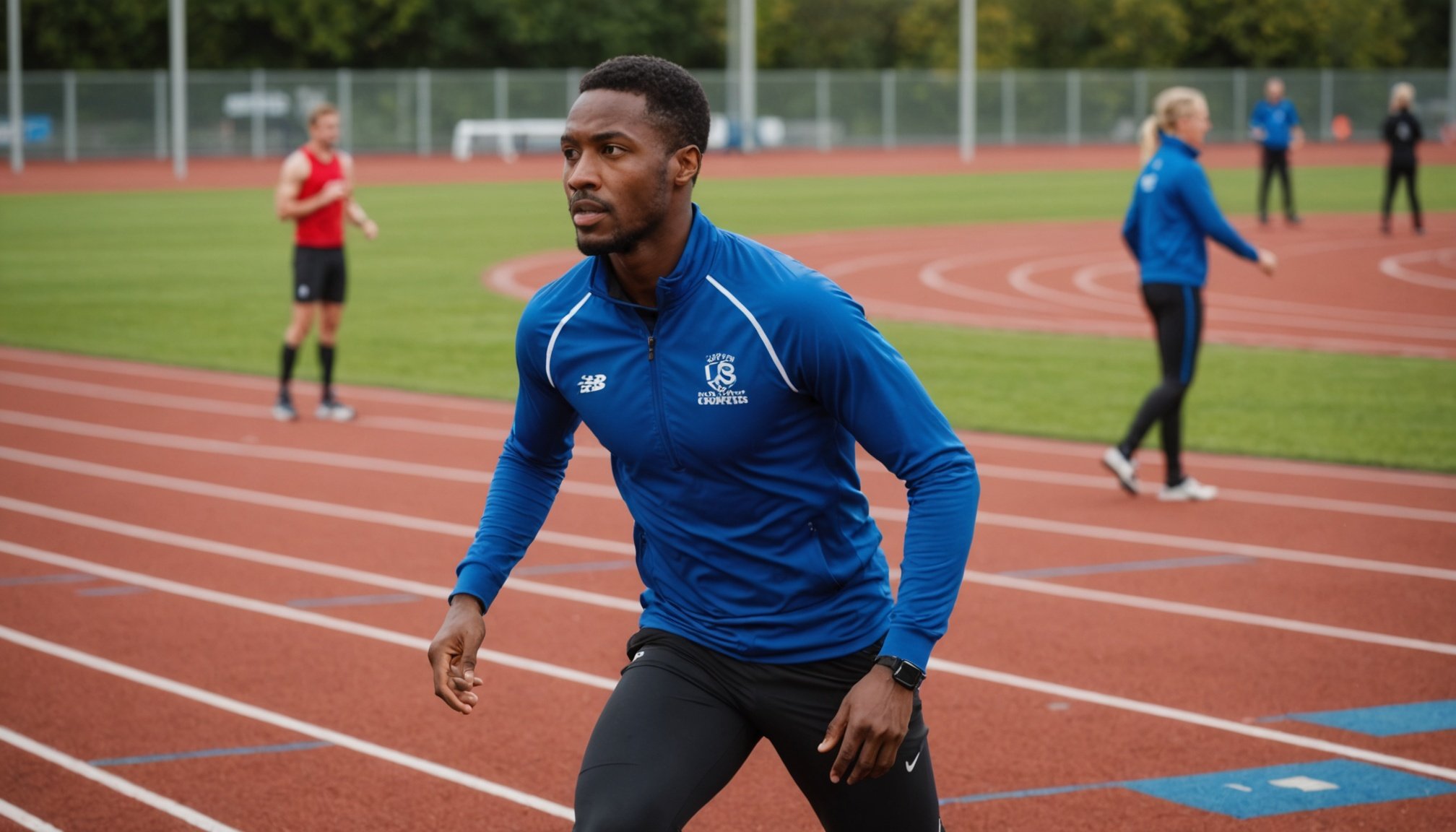Integrating Mental Health Strategies into Training: A Guide for UK Track and Field Coaches
The Importance of Mental Health in Athletics
When we think about athletic performance, we often focus on the physical aspects: strength, speed, endurance. However, mental health is just as crucial for athletes, particularly in high-pressure sports like track and field. Mental health strategies are not just about managing stress and anxiety; they are integral to enhancing performance and ensuring the overall well-being of athletes.
“Mental health is not just the absence of mental illness, but it is a state of well-being in which an individual realizes their own abilities, can cope with the normal stresses of life, can work productively and fruitfully, and is able to make a contribution to their community,” notes the World Health Organization. For track and field coaches, understanding and supporting the mental health of their athletes is vital.
Identifying Mental Health Challenges in Athletes
Athletes, especially those at the elite level, face unique mental health challenges. The pressure to perform, the fear of injury, and the intense training regimens can all take a toll on mental well-being.
- Performance Anxiety: The fear of not meeting expectations can be overwhelming. Athletes may experience anxiety before competitions, which can affect their performance.
- Injury and Recovery: Injuries are common in track and field, and the recovery process can be mentally challenging. Athletes may feel a loss of identity or purpose during this time.
- Burnout: The intense training schedules and constant travel can lead to physical and mental exhaustion.
- Social Pressure: Athletes often face pressure from coaches, teammates, and family members to perform well.
Strategies for Supporting Mental Health
Mindfulness and Meditation
Mindfulness and meditation are powerful tools for managing stress and anxiety. These practices help athletes focus on the present moment and reduce worries about the future or past.
Also read : Top Strategies to Combat Homesickness Among UK Athletes During Training Camps
- Daily Meditation Sessions: Encourage athletes to practice short meditation sessions daily. Even 10-15 minutes can make a significant difference.
- Guided Sessions: Use apps or guided meditation sessions to help athletes get started.
- Incorporating Mindfulness into Training: Integrate mindfulness exercises into training sessions. For example, focus on breathing techniques during warm-ups or cool-downs.
Visualization and Positive Self-Talk
Visualization and positive self-talk are techniques used by many elite athletes to enhance performance and manage stress.
- Visualization Exercises: Encourage athletes to visualize their performances, focusing on success and overcoming challenges.
- Positive Affirmations: Teach athletes to use positive affirmations to boost their confidence and morale.
Building a Support Network
A strong support network is crucial for athletes’ mental health. This includes coaches, teammates, family, and mental health professionals.
- Regular Check-Ins: Hold regular one-on-one check-ins with athletes to discuss their mental health and any challenges they are facing.
- Team Bonding Activities: Organize team bonding activities that promote camaraderie and support among teammates.
- Access to Mental Health Professionals: Ensure athletes have access to mental health professionals who can provide additional support when needed.
Creating a Mental Health-Friendly Training Environment
The training environment plays a significant role in athletes’ mental health. Here are some ways to create a supportive and healthy environment:
Flexible Training Plans
Flexible training plans can help reduce stress and prevent burnout.
- Individualized Training: Use tools like the Athlète 360 app to gather bi-daily information on athletes’ emotional states and adjust training plans accordingly[4].
- Periodization: Implement periodized training plans that include rest and recovery phases to avoid burnout.
Cross-Training and Variety
Cross-training and incorporating variety into training can help reduce the risk of injury and mental fatigue.
- Cross-Training Activities: Include activities like swimming, cycling, or strength training to vary the physical demands on athletes. For example, swimming can be an excellent way to maintain cardiovascular fitness while reducing the impact on joints[1].
- Incorporating Different Disciplines: For track and field athletes, incorporating different disciplines such as trail running or using trekking poles can add variety and reduce the risk of overuse injuries[1].
Practical Advice for Coaches
Here are some practical tips for coaches to integrate mental health strategies into their training programs:
Educate Yourself
- Stay Updated: Keep up-to-date with the latest research on mental health in sports. Use resources like Google Scholar and PubMed to find relevant studies.
- Workshops and Seminars: Attend workshops and seminars focused on mental health in sports to gain more insights.
Communicate Effectively
- Open Dialogue: Encourage an open dialogue with your athletes about their mental health. Make them feel comfortable discussing their feelings and concerns.
- Active Listening: Practice active listening when athletes talk about their mental health. This shows that you value and respect their feelings.
Set Realistic Goals
- Performance Goals: Set realistic performance goals that are achievable and do not put undue pressure on athletes.
- Progress Tracking: Track progress regularly and celebrate small victories along the way.
Case Studies and Examples
Elite Athletes and Mental Health
Elite athletes often face significant mental health challenges, but many have found ways to manage these effectively.
- Example: Olympic athletes like Simone Biles have spoken publicly about their mental health struggles and the importance of seeking help. Biles’ decision to prioritize her mental health during the Olympics was a powerful message to athletes everywhere.
Team-Level Initiatives
Teams can also implement mental health initiatives that benefit all athletes.
- Example: Some teams have introduced mandatory mental health check-ins and workshops as part of their training programs. These initiatives help create a supportive team culture where athletes feel comfortable discussing their mental health.
Table: Comparing Mental Health Strategies
| Strategy | Description | Benefits | Challenges |
|---|---|---|---|
| Mindfulness and Meditation | Daily meditation sessions to reduce stress and anxiety | Improves focus, reduces anxiety | Requires consistent practice, initial difficulty in quieting the mind |
| Visualization and Positive Self-Talk | Visualizing success and using positive affirmations | Boosts confidence, enhances performance | May feel unnatural at first, requires regular practice |
| Building a Support Network | Regular check-ins, team bonding activities, access to mental health professionals | Provides emotional support, reduces feelings of isolation | Requires time and resources, may be challenging to find the right professionals |
| Flexible Training Plans | Individualized training plans, periodization | Reduces stress, prevents burnout | Requires detailed planning, may be challenging to adjust plans based on athlete feedback |
| Cross-Training and Variety | Incorporating different activities and disciplines | Reduces risk of injury, mental fatigue | May require additional resources, time to adjust to new activities |
Integrating mental health strategies into training programs is essential for the well-being and performance of track and field athletes. By understanding the unique challenges athletes face, coaches can create supportive environments that foster both physical and mental health.
As Raphaël Homat, an expert in sports performance, notes, “The mental preparation of athletes is as important as their physical preparation. It’s about creating a holistic approach to training that includes both aspects”[3].
By following the strategies outlined here, coaches can help their athletes achieve high performance while maintaining good mental health. Remember, a healthy athlete is a performing athlete.











